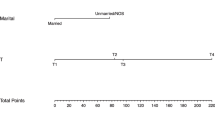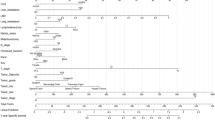Abstract
Purpose
Colon cancer is the third most incident and life-threatening cancer in Taiwan. A comprehensive survival prediction system would greatly benefit clinical practice in this area. This study was designed to develop an accurate prognostic model for colon cancer patients by using clinicopathological variables obtained from the Taiwan Cancer Registry database.
Methods
We analyzed 20,218 colon cancer patients from the Taiwan Cancer Registry database, who were diagnosed between 2007 and 2015, were followed up until December 31, 2017, and had undergone curative surgery. We proposed two prognostic models, with different combinations of predictors. The first model used only traditional clinical features. The second model included several colon cancer site-specific factors (circumferential resection margin, perineural invasion, obstruction, and perforation), in addition to the traditional features. Both prediction models were developed by using a Cox proportional hazards model. Furthermore, we investigated whether race is a significant predictor of survival in colon cancer patients by using Model 1 on the Surveillance, Epidemiology, and End Results (SEER) cancer registry dataset.
Results
The proposed models displayed a robust prediction performance (all Harrell's c-index >0.8). For both the calibration and validation steps, the differences between the predicted and observed mortality were mostly less than 5%.
Conclusions
The prediction model (Model 1) is an effective predictor of survival regardless of the ethnic background of patients and can potentially help to provide better prediction of colon cancer-specific survival outcomes, thus allowing physicians to improve treatment plans.

Similar content being viewed by others
References
Gabriel E, Attwood K, Thirunavukarasu P, Al-Sukhni E, Boland P, Nurkin S. Predicting individualized postoperative survival for stage II/III colon cancer using a mobile application derived from the national cancer data base. J Am Coll Surg. 2016;222(3):232–44. https://doi.org/10.1016/j.jamcollsurg.2015.12.019
Hippisley-Cox J, Coupland C. Development and validation of risk prediction equations to estimate survival in patients with colorectal cancer: cohort study. BMJ. 2017;357:j2497. https://doi.org/10.1136/bmj.j2497.
Valentini V, van Stiphout RGPM, Lammering G, et al. Nomograms for predicting local recurrence, distant metastases, and overall survival for patients with locally advanced rectal cancer on the basis of European randomized clinical trials. J Clin Oncol. 2011;29(23):3163–72. https://doi.org/10.1200/JCO.2010.33.1595.
Honda M, Oba K, Akiyoshi T, et al. Development and validation of a prognostic nomogram for colorectal cancer after radical resection based on individual patient data from three large-scale phase III trials. Oncotarget. 2017;8(58):99150–60.
Holowatyj AN, Ruterbusch JJ, Rozek LS, Cote ML, Stoffel EM. Racial/ethnic disparities in survival among patients with young-onset colorectal cancer. J Clin Oncol. 2016;34(18):2148.
Wang J, Hassett JM, Dayton MT, Kulaylat MN. The prognostic superiority of log odds of positive lymph nodes in stage III colon cancer. J Gastrointest Surg. 2008;12(10):1790–6.
Chiang CJ, Wang YW, Lee WC. Taiwan’s Nationwide Cancer Registry System of 40 years: Past, present, and future. J Formos Med Assoc. 2019;118(5):856–8. https://doi.org/10.1016/j.jfma.2019.01.012.
Chiang CJ, You SL, Chen CJ, Yang YW, Lo WC, Lai MS. Quality assessment and improvement of nationwide cancer registration system in Taiwan: a review. Jpn J Clin Oncol. 2015;45(3):291–6. https://doi.org/10.1093/jjco/hyu211.
Chiang C-J, Chen Y-C, Chen C-J, You S-L, Lai M-S. Cancer trends in Taiwan. Japanese J Clin Oncol. 2010;40(10):897–904.
Chang JS, Chen L-T, Shan Y-S, Chu P-Y, Tsai C-R, Tsai H-J. The incidence and survival of pancreatic cancer by histology, including rare subtypes: a nation-wide cancer registry-based study from Taiwan. Cancer Med. 2018/11/01 2018;7(11):5775–88. https://doi.org/10.1002/cam4.1795
Chang L-C, Huang C-F, Lai M-S, Shen L-J, Wu F-LL, Cheng W-F. Prognostic factors in epithelial ovarian cancer: a population-based study. PLOS One. 2018;13(3):e0194993. https://doi.org/10.1371/journal.pone.0194993
Huang C-C, Chan S-Y, Lee W-C, Chiang C-J, Lu T-P, Cheng SH-C. Development of a prediction model for breast cancer based on the national cancer registry in Taiwan. Breast Cancer Res. 2019;21(1):92.
Tsai H-J, Wu C-C, Tsai C-R, Lin S-F, Chen L-T, Chang JS. The epidemiology of neuroendocrine tumors in Taiwan: a nation-wide cancer registry-based study. PLOS One. 2013;8(4):e62487. https://doi.org/10.1371/journal.pone.0062487.
dos Reis FJC, Wishart GC, Dicks EM, et al. An updated PREDICT breast cancer prognostication and treatment benefit prediction model with independent validation. Breast Cancer Res. 2017;19(1):58.
Wishart G, Bajdik C, Dicks E, et al. PREDICT Plus: development and validation of a prognostic model for early breast cancer that includes HER2. Br J Cancer. 2012;107(5):800–7.
Wishart GC, Azzato EM, Greenberg DC, et al. PREDICT: a new UK prognostic model that predicts survival following surgery for invasive breast cancer. Breast Cancer Res. 2010;12(1):R1.
Cienfuegos JA, Martínez P, Baixauli J, et al. Perineural Invasion is a Major Prognostic and Predictive Factor of Response to Adjuvant Chemotherapy in Stage I–II Colon Cancer. Ann Surg Oncol. 2017/04/01 2017;24(4):1077–84. https://doi.org/10.1245/s10434-016-5561-0
Tang X-Y, Huang M-X, Han S-Q, et al. The circumferential resection margin is a prognostic predictor in colon cancer. Original Research. Front Oncol. 2020;10:927. https://doi.org/10.3389/fonc.2020.00927
Katoh H, Yamashita K, Wang G, Sato T, Nakamura T, Watanabe M. Prognostic significance of preoperative bowel obstruction in stage III colorectal cancer. Ann Surg Oncol. 2011;18(9):2432–41. https://doi.org/10.1245/s10434-011-1625-3
Steinberg SM, Barkin JS, Kaplan RS, Stablein DM. Prognostic indicators of colon tumors. The gastrointestinal tumor study group experience. Cancer. 1986;57(9):1866–70. https://doi.org/10.1002/1097-0142(19860501)57:9<1866::AID-CNCR2820570928>3.0.CO;2-T
Saha AK, Smith KJE, Sue-Ling H, Sagar PM, Burke D, Finan PJ. Prognostic factors for survival after curative resection of Dukes’ B colonic cancer. Colorectal Dis. 2011;13(12):1390–4. https://doi.org/10.1111/j.1463-1318.2010.02507.x
Amin MB, Edge SB. AJCC cancer staging manual. Springer; 2017.
Liebig C, Ayala G, Wilks JA, Berger DH, Albo D. Perineural invasion in cancer. Cancer. 2009;115(15):3379–91. https://doi.org/10.1002/cncr.24396
Vaccaro CA, Im V, Rossi GL, et al. Lymph node ratio as prognosis factor for colon cancer treated by colorectal surgeons. Dis Colon Rectum. 2009;52(7):1244–50. https://doi.org/10.1007/DCR.0b013e3181a65f0b.
Cox DR. Regression models and life-tables. J R Stat Soc Series B (Methodological). 1972;34(2):187–220.
T T. A Package for Survival Analysis in R. R package version 3.2-3, https://CRAN.R-project.org/package=survival. 2020.
Therneau TM, Grambsch PM. The Cox model. Modeling survival data: extending the Cox model. Springer; 2000:39–77.
Royston P, Altman DG. External validation of a Cox prognostic model: principles and methods. BMC Med Res Methodol. 2013;13(1):33.
Harrell FE Jr, Califf RM, Pryor DB, Lee KL, Rosati RA. Evaluating the yield of medical tests. JAMA. 1982;247(18):2543–6.
Surveillance E, and End Results (SEER) Program (www.seer.cancer.gov) Research Data (1973-2015), National Cancer Institute, DCCPS, Surveillance Research Program, released April 2018, based on the November 2017 submission.
Goffredo P, Zhou P, Ginader T, et al. Positive circumferential resection margins following locally advanced colon cancer surgery: Risk factors and survival impact. J Surg Oncol. 2020;121(3):538–46. https://doi.org/10.1002/jso.25801
Huh JW, Lee JH, Kim HR, Kim YJ. Prognostic significance of lymphovascular or perineural invasion in patients with locally advanced colorectal cancer. Am J Surg. 2013;206(5):758–63. https://doi.org/10.1016/j.amjsurg.2013.02.010
Knijn N, Mogk SC, Teerenstra S, Simmer F, Nagtegaal ID. Perineural invasion is a strong prognostic factor in colorectal cancer: a systematic review. Am J Surg Pathol. 2016;40(1):103–12. https://doi.org/10.1097/pas.0000000000000518.
Liebig C, Ayala G, Wilks J, et al. Perineural invasion is an independent predictor of outcome in colorectal cancer. J Clin Oncol. 2009;27(31):5131–7. https://doi.org/10.1200/JCO.2009.22.4949.
Chen H-S, Sheen-Chen S-M. Obstruction and perforation in colorectal adenocarcinoma: an analysis of prognosis and current trends. Surgery. 2000;127(4):370–6. https://doi.org/10.1067/msy.2000.104674
McArdle CS, McMillan DC, Hole DJ. The impact of blood loss, obstruction and perforation on survival in patients undergoing curative resection for colon cancer. Br J Surg. 2006;93(4):483–8. https://doi.org/10.1002/bjs.5269.
Wang H-S, Lin J-K, Mou C-Y, et al. Long-term prognosis of patients with obstructing carcinoma of the right colon. Am J Surg. 2004;187(4):497–500. https://doi.org/10.1016/j.amjsurg.2003.12.028
Chen T-M, Huang Y-T, Wang G-C. Outcome of colon cancer initially presenting as colon perforation and obstruction. World J Surg Oncol. 2017;15(1):164. https://doi.org/10.1186/s12957-017-1228-y
Koh FH, Tan K-K. Complete mesocolic excision for colon cancer: is it worth it? J Gastrointest Oncol. 2019;10(6):1215.
Han D-P, Lu A-G, Feng H, et al. Long-term results of laparoscopy-assisted radical right hemicolectomy with D3 lymphadenectomy: clinical analysis with 177 cases. Int J Colorectal Dis. 2013;28(5):623–9.
Tentes A-AK, Mirelis C, Karanikiotis C, Korakianitis O. Radical lymph node resection of the retroperitoneal area for left-sided colon cancer. Langenbeck's Arch Surg. 2007;392(2):155–60.
Chow CF, Kim SH. Laparoscopic complete mesocolic excision: West meets East. World J Gastroenterol. 2014;20(39):14301.
Hohenberger W, Weber K, Matzel K, Papadopoulos T, Merkel S. Standardized surgery for colonic cancer: complete mesocolic excision and central ligation–technical notes and outcome. Colorectal Dis. 2009;11(4):354–64.
Klahan S, Wong HS-C, Tu S-H, et al. Identification of genes and pathways related to lymphovascular invasion in breast cancer patients: a bioinformatics analysis of gene expression profiles. Tumor Biology. 2017;39(6):1010428317705573.
Favoriti P, Carbone G, Greco M, Pirozzi F, Pirozzi REM, Corcione F. Worldwide burden of colorectal cancer: a review. Updates in Surgery. 2016;68(1):7–11. https://doi.org/10.1007/s13304-016-0359-y
Rawla P, Sunkara T, Barsouk A. Epidemiology of colorectal cancer: incidence, mortality, survival, and risk factors. Prz Gastroenterol. 2019;14(2):89–103. https://doi.org/10.5114/pg.2018.81072.
Arnold M, Sierra MS, Laversanne M, Soerjomataram I, Jemal A, Bray F. Global patterns and trends in colorectal cancer incidence and mortality. Gut. 2017;66(4):683–91.
Araghi M, Soerjomataram I, Jenkins M, et al. Global trends in colorectal cancer mortality: Projections to the year 2035. Int J Cancer. 2019;144(12):2992–3000.
Byers TE, Wolf HJ, Bauer KR, et al. The impact of socioeconomic status on survival after cancer in the United States. Cancer. 2008;113(3):582–91.
Chen VW, Fenoglio-Preiser CM, Wu XC, et al. Aggressiveness of colon carcinoma in blacks and whites. National Cancer Institute Black/White Cancer Survival Study Group. Cancer Epidemiol Prevent Biomarkers. 1997;6(12):1087–93.
Page W, Kuntz A. Racial and socioeconomic factors in cancer survival. A comparison of Veterans Administration results with selected studies. Cancer. 1980;45(5):1029–40.
Kogevinas M, Porta M. Socioeconomic differences in cancer survival: a review of the evidence. IARC Scientific Publications. 1997;138(138):177–206.
Wegner EL, Kolonel LN, Nomura AM, Lee J. Racial and socioeconomic status differences in survival of colorectal cancer patients in Hawaii. Cancer. 1982;49(10):2208–16.
Bonett A, Roder D, Esterman A. Determinants of case survival for cancers of the lung, colon, breast and cervix in South Australia. Med J Australia. 1984;141(11):705–9.
Kudryavtseva AV, Lipatova AV, Zaretsky AR, et al. Important molecular genetic markers of colorectal cancer. Oncotarget. 2016;7(33):53959.
Walther A, Johnstone E, Swanton C, Midgley R, Tomlinson I, Kerr D. Genetic prognostic and predictive markers in colorectal cancer. Nat Rev Cancer. 2009;9(7):489.
Ibrahim A, Hugerth LW, Hases L, et al. Colitis‐induced colorectal cancer and intestinal epithelial estrogen receptor beta impact gut microbiota diversity. Int J Cancer. 2019;144(12):3086–98.
Barry MJ, Edgman-Levitan S. Shared decision making—the pinnacle of patient-centered care. N Engl J Med. 2012;366(9):780–1.
Elwyn G, Frosch D, Thomson R, et al. Shared decision making: a model for clinical practice. J Gen Intern Med. 2012;27(10):1361–7.
Charles C, Gafni A, Whelan T. Shared decision-making in the medical encounter: what does it mean?(or it takes at least two to tango). Soc Sci Med. 1997;44(5):681–92.
Acknowledgments
This study was supported by the Health Promotion Administration, Ministry of Health and Welfare, grant no. A1081115: Tobacco Health and Welfare Taxation; and the Ministry of Science and Technology, Taiwan, (MOST-106-2314-B-002-134-MY2 and MOST-104-2314-B-002-107-MY2); and the Hammer Family Office. The content of this research may not represent the opinion of the Health Promotion Administration, Ministry of Health and Welfare. The funders had no role in study design, data collection and analysis, the decision to publish, or preparation of the manuscript. The authors thank Melissa Stauffer, PhD, for editing the manuscript.
Author information
Authors and Affiliations
Corresponding author
Ethics declarations
Disclousres
The authors declare no potential conflicts of interest.
Additional information
Publisher's Note
Springer Nature remains neutral with regard to jurisdictional claims in published maps and institutional affiliations.
Supplementary Information
Below is the link to the electronic supplementary material.
Rights and permissions
About this article
Cite this article
Chan, HC., Huang, CC., Huang, CC. et al. Predicting Colon Cancer-Specific Survival for the Asian Population Using National Cancer Registry Data from Taiwan. Ann Surg Oncol 29, 853–863 (2022). https://doi.org/10.1245/s10434-021-10646-2
Received:
Accepted:
Published:
Issue Date:
DOI: https://doi.org/10.1245/s10434-021-10646-2




